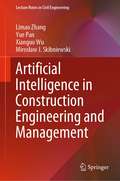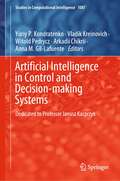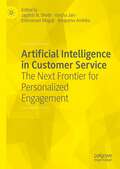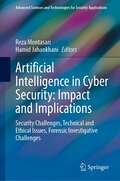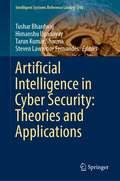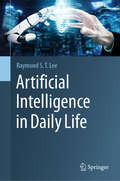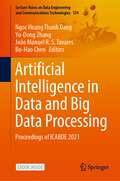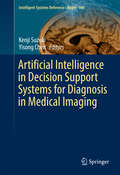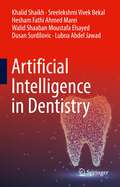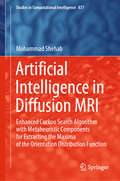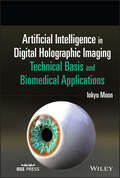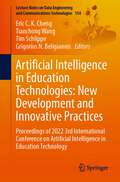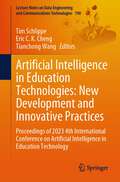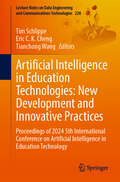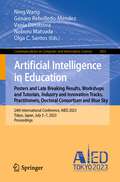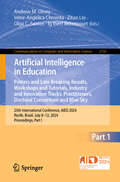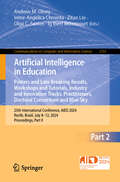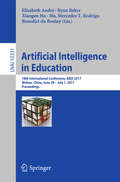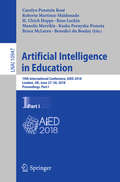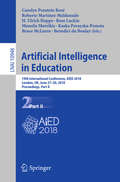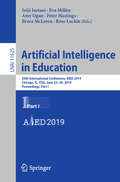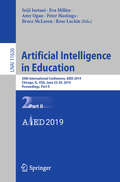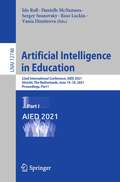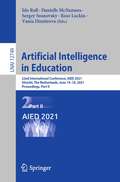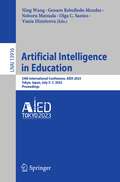- Table View
- List View
Artificial Intelligence in Construction Engineering and Management (Lecture Notes in Civil Engineering #163)
by Limao Zhang Yue Pan Xianguo Wu Mirosław J. SkibniewskiThis book highlights the latest technologies and applications of Artificial Intelligence (AI) in the domain of construction engineering and management. The construction industry worldwide has been a late bloomer to adopting digital technology, where construction projects are predominantly managed with a heavy reliance on the knowledge and experience of construction professionals. AI works by combining large amounts of data with fast, iterative processing, and intelligent algorithms (e.g., neural networks, process mining, and deep learning), allowing the computer to learn automatically from patterns or features in the data. It provides a wide range of solutions to address many challenging construction problems, such as knowledge discovery, risk estimates, root cause analysis, damage assessment and prediction, and defect detection. A tremendous transformation has taken place in the past years with the emerging applications of AI. This enables industrial participants to operate projects more efficiently and safely, not only increasing the automation and productivity in construction but also enhancing the competitiveness globally.
Artificial Intelligence in Control and Decision-making Systems: Dedicated to Professor Janusz Kacprzyk (Studies in Computational Intelligence #1087)
by Witold Pedrycz Vladik Kreinovich Anna M. Gil-Lafuente Yuriy P. Kondratenko Arkadii ChikriiThis book presents an authoritative collection of contributions reporting on computational intelligence, fuzzy systems as well as artificial intelligence techniques for modeling, optimization, control and decision-making together with applications and case studies in engineering, management and economic sciences. Dedicated to the Academician of the Polish Academy of Sciences, Professor Janusz Kacprzyk in recognition of his pioneering work, the book reports on theories, methods and new challenges in artificial intelligence, thus offering not only a timely reference guide but also a source of new ideas and inspirations for graduate students and researchers alike.The book consists of the 18 chapters, presented by distinguished and experienced authors from 16 different countries (Australia, Brazil, Canada, Chile, Germany, Hungary, Israel, Italy, China, R.N.Macedonia, Saudi Arabia, Spain, Turkey, United States, Ukraine, and Vietnam). All chapters are grouped into three parts: Computational Intelligence and Fuzzy Systems, Artificial Intelligence Techniques in Modelling and Optimization, and Computational Intelligence in Control and Decision Support Processes.The book reflects recent developments and new directions in artificial intelligence, including computation method of the interval hull to solutions of interval and fuzzy interval linear systems, fuzzy-Petri-networks in supervisory control of Markov processes in robotic systems, fuzzy approaches for linguistic data summaries, first-approximation analysis for choosing fuzzy or neural systems and type-1 or type-2 fuzzy sets, matrix resolving functions in game dynamic problems, evolving stacking neuro-fuzzy probabilistic networks and their combined learning in online pattern recognition tasks, structural optimization of fuzzy control and decision-making systems, neural and granular fuzzy adaptive modeling, state and action abstraction for search and reinforcement learning algorithms. Among the most successful and perspective implementations in practical areas of human activity are tentative algorithms for neurological disorders, human-centric question-answering system, OWA operators in pensions, evaluation of the perception of public safety through fuzzy and multi-criteria approach, a multicriteria hierarchical approach to investment location choice, intelligent traffic signal control and generative adversarial networks in cybersecurity.
Artificial Intelligence in Customer Service: The Next Frontier for Personalized Engagement
by Jagdish N. Sheth Emmanuel Mogaji Varsha Jain Anupama AmbikaThis edited volume elucidates how artificial intelligence (AI) can enable customer service to achieve higher customer engagement, superior user experiences, and increased well-being among customers and employees.As customer expectations dictate 24/7 availability from service departments and market pressures call for lower costs with higher efficiency, businesses have accepted that AI is vital in maintaining customer satisfaction. Yet, firms face tough challenges in choosing the right tool, optimizing integration, and striking the appropriate balance between AI systems and human efforts. In this context, chapters in this book capture the latest advancements in AI-enabled customer service through real-world examples. This volume offers a global perspective on this contemporary issue, covering topics such as the use of AI in enhancing customer well-being, data and technology integration, and customer engagement.
Artificial Intelligence in Cyber Security: Security Challenges, Technical and Ethical Issues, Forensic Investigative Challenges (Advanced Sciences and Technologies for Security Applications)
by Hamid Jahankhani Reza MontasariThe book provides a valuable reference for cyber security experts, digital forensic practitioners and network security professionals. In recent years, AI has gained substantial attention from researchers in both academia and industry, and as a result AI’s capabilities are constantly increasing at an extraordinary pace. AI is considered to be the Fourth Industrial Revolution or at least the next significant technological change after the evolution in mobile and cloud computing technologies. AI is a vehicle for improving the quality of our lives across every spectrum with a broad range of beneficial applications in various sectors. Notwithstanding its numerous beneficial use, AI simultaneously poses numerous legal, ethical, security and privacy challenges that are compounded by its malicious use by criminals. These challenges pose many risks to both our privacy and security at national, organisational and individual levels.In view of this, this book aims to help address some of these challenges focusing on the implication, impact and mitigations of the stated issues. The book provides a comprehensive coverage of not only the technical and ethical issues presented by the use of AI but also the adversarial application of AI and its associated implications. The authors recommend a number of novel approaches to assist in better detecting, thwarting and addressing AI challenges. The book also looks ahead and forecasts what attacks can be carried out in the future through the malicious use of the AI if sufficient defences are not implemented. The research contained in the book fits well into the larger body of work on various aspects of AI and cyber security.It is also aimed at researchers seeking to obtain a more profound knowledge of machine learning and deep learning in the context of cyber security, digital forensics and cybercrime. Furthermore, the book is an exceptional advanced text for Ph.D. and master’s degree programmes in cyber security, digital forensics, network security, cyber terrorism and computer science. Each chapter contributed to the book is written by an internationally renowned expert who has extensive experience in law enforcement, industry or academia. Furthermore, this book blends advanced research findings with practice-based methods to provide the reader with advanced understanding and relevant skills.
Artificial Intelligence in Cyber Security: Theories and Applications (Intelligent Systems Reference Library #240)
by Steven Lawrence Fernandes Tarun Kumar Sharma Tushar Bhardwaj Himanshu UpadhyayThis book highlights the applications and theory of artificial intelligence in the domain of cybersecurity. The book proposes new approaches and ideas to present applications of innovative approaches in real-time environments. In the past few decades, there has been an exponential rise in the application of artificial intelligence technologies (such as deep learning, machine learning, blockchain) for solving complex and intricate problems arising in the domain of cybersecurity. The versatility of these techniques has made them a favorite among scientists and researchers working in diverse areas. This book serves as a reference for young scholars, researchers, and industry professionals working in the field of Artificial Intelligence and Cybersecurity.
Artificial Intelligence in Daily Life
by Raymond S. LeeGiven the exponential growth of Artificial Intelligence (AI) over the past few decades, AI and its related applications have become part of daily life in ways that we could never have dreamt of only a century ago. Our routines have been changed beyond measure by robotics and AI, which are now used in a vast array of services. Though AI is still in its infancy, we have already benefited immensely. This book introduces readers to basic Artificial Intelligence concepts, and helps them understand the relationship between AI and daily life. In the interest of clarity, the content is divided into four major parts. Part I (AI Concepts) presents fundamental concepts of and information on AI; while Part II (AI Technology) introduces readers to the five core AI Technologies that provide the building blocks for various AI applications, namely: Machine Learning (ML), Data Mining (DM), Computer Vision (CV), Natural Languages Processing (NLP), and Ontology-based Search Engine (OSE). In turn, Part III (AI Applications) reviews major contemporary applications that are impacting our ways of life, working styles and environment, ranging from intelligent agents and robotics to smart campus and smart city projects. Lastly, Part IV (Beyond AI) addresses related topics that are vital to the future development of AI. It also discusses a number of critical issues, such as AI ethics and privacy, the development of a conscious mind, and autonomous robotics in our daily lives.
Artificial Intelligence in Data and Big Data Processing: Proceedings of ICABDE 2021 (Lecture Notes on Data Engineering and Communications Technologies #124)
by João Manuel R. S. Tavares Yu-Dong Zhang Ngoc Hoang Thanh Dang Bo-Hao ChenThe book presents studies related to artificial intelligence (AI) and its applications to process and analyze data and big data to create machines or software that can better understand business behavior, industry activities, and human health. The studies were presented at “The 2021 International Conference on Artificial Intelligence and Big Data in Digital Era” (ICABDE 2021), which was held in Ho Chi Minh City, Vietnam, during December 18-19, 2021. The studies are pointing toward the famous slogan in technology “Make everything smarter,” i.e., creating machines that can understand and can communicate with humans, and they must act like humans in different aspects such as vision, communication, thinking, feeling, and acting.“A computer would deserve to be called intelligent if it could deceive a human into believing that it was human” —Alan Turing
Artificial Intelligence in Decision Support Systems for Diagnosis in Medical Imaging (Intelligent Systems Reference Library #140)
by Kenji Suzuki Yisong ChenThis book offers the first comprehensive overview of artificial intelligence (AI) technologies in decision support systems for diagnosis based on medical images, presenting cutting-edge insights from thirteen leading research groups around the world. Medical imaging offers essential information on patients' medical condition, and clues to causes of their symptoms and diseases. Modern imaging modalities, however, also produce a large number of images that physicians have to accurately interpret. This can lead to an "information overload" for physicians, and can complicate their decision-making. As such, intelligent decision support systems have become a vital element in medical-image-based diagnosis and treatment. Presenting extensive information on this growing field of AI, the book offers a valuable reference guide for professors, students, researchers and professionals who want to learn about the most recent developments and advances in the field.
Artificial Intelligence in Dentistry
by Khalid Shaikh Sreelekshmi Vivek Bekal Hesham Fathi Marei Walid Shaaban Elsayed Dusan Surdilovic Lubna Abdel JawadThis book provides an introduction to next-generation applications and technologies for improving diagnostic accuracy and prediction of treatment outcomes in dentistry through the use of artificial intelligence (AI) and machine learning (ML). The authors attempt to bridge the gap between dental research and global health outcomes, as well as provide a comprehensive guide to general and clinical aspects of dental and oral health issues and the etiology, prevalence, assessment, and management of these conditions. This book combines engineering applications and medical healthcare and will be an important reference for researchers, biomedical engineers, dental students, and dental practitioners.
Artificial Intelligence in Diffusion MRI: Enhanced Cuckoo Search Algorithm with Metaheuristic Components for Extracting the Maxima of the Orientation Distribution Function (Studies in Computational Intelligence #877)
by Mohammad ShehabThis book focuses on the use of artificial intelligence to address a specific problem in the brain – the orientation distribution function. It discusses three aspects: (i) Preparing, enhancing and evaluating one of the cuckoo search algorithms (CSA); (ii) Describing the problem: Diffusion-weighted magnetic resonance imaging (DW-MRI) is used for non-invasive investigations of anatomical connectivity in the human brain, while Q-ball imaging (QBI) is a diffusion MRI reconstruction technique based on the orientation distribution function (ODF), which detects the dominant fiber orientations; however, ODF lacks local estimation accuracy along the path. (iii) Evaluating the performance of the CSA versions in solving the ODF problem using synthetic and real-world data. This book appeals to both postgraduates and researchers who are interested in the fields of medicine and computer science.
Artificial Intelligence in Digital Holographic Imaging: Technical Basis and Biomedical Applications (Wiley Series in Biomedical Engineering and Multi-Disciplinary Integrated Systems)
by Inkyu MoonArtificial Intelligence in Digital Holographic Imaging Technical Basis and Biomedical Applications An eye-opening discussion of 3D optical sensing, imaging, analysis, and pattern recognition Artificial intelligence (AI) has made great progress in recent years. Digital holographic imaging has recently emerged as a powerful new technique well suited to explore cell structure and dynamics with a nanometric axial sensitivity and the ability to identify new cellular biomarkers. By combining digital holography with AI technology, including recent deep learning approaches, this system can achieve a record-high accuracy in non-invasive, label-free cellular phenotypic screening. It opens up a new path to data-driven diagnosis. Artificial Intelligence in Digital Holographic Imaging introduces key concepts and algorithms of AI to show how to build intelligent holographic imaging systems drawing on techniques from artificial neural networks, convolutional neural networks, and generative adversarial network. Readers will be able to gain an understanding of the basics for implementing AI in holographic imaging system designs and connecting practical biomedical questions that arise from the use of digital holography with various AI algorithms in intelligence models. What’s Inside Introductory background on digital holography Key concepts of digital holographic imaging Deep-learning techniques for holographic imaging AI techniques in holographic image analysis Holographic image-classification models Automated phenotypic analysis of live cells For readers with various backgrounds, this book provides a detailed discussion of the use of intelligent holographic imaging system in biomedical fields with great potential for biomedical application.
Artificial Intelligence in Education Technologies: Proceedings of 2022 3rd International Conference on Artificial Intelligence in Education Technology (Lecture Notes on Data Engineering and Communications Technologies #154)
by Eric C. K. Cheng Grigorios N. Beligiannis Tianchong Wang Tim SchlippeThis edited book is a collection of selected research papers presented at the 2022 3rd International Conference on Artificial Intelligence in Education Technology (AIET 2022), held in Wuhan, China, on July 1–3, 2022. AIET establishes a platform for AI in education researchers to present research, exchange innovative ideas, propose new models, as well as demonstrate advanced methodologies and novel systems. The book is divided into five main sections – 1) AI in Education in the Post-COVID New Norm, 2) Emerging AI Technologies, Methods, Systems and Infrastructure, 3) Innovative Practices of Teaching and Assessment Driven by AI and Education Technologies, 4) Curriculum, Teacher Professional Development and Policy for AI in Education, and 5) Issues and Discussions on AI In Education and Future Development. Through these sections, the book provides a comprehensive picture of the current status, emerging trends, innovations, theory, applications, challenges and opportunities of current AI in education research. This timely publication is well aligned with UNESCO’s Beijing Consensus on Artificial Intelligence (AI) and Education. It is committed to exploring how AI may play a role in bringing more innovative practices, transforming education in the post-pandemic new norm and triggering an exponential leap toward the achievement of the Education 2030 Agenda. Providing broad coverage of recent technology-driven advances and addressing a number of learning-centric themes, the book is an informative and useful resource for researchers, practitioners, education leaders and policy-makers who are involved or interested in AI and education.
Artificial Intelligence in Education Technologies: Proceedings of 2023 4th International Conference on Artificial Intelligence in Education Technology (Lecture Notes on Data Engineering and Communications Technologies #190)
by Eric C. K. Cheng Tianchong Wang Tim SchlippeThis book is a collection of selected research papers presented at the 2023 4th International Conference on Artificial Intelligence in Education Technology (AIET 2023), held in Berlin, Germany, on June 30 - July 2, 2023. AIET establishes a platform for AI in education researchers to present research, exchange innovative ideas, propose new models, as well as demonstrate advanced methodologies and novel systems. It is a timely and up-to-date publication responsive to the rapid development of AI technologies, practices and their increasingly complex interplay with the education domain. It promotes the cross-fertilisation of knowledge and ideas from researchers in various fields to construct the interdisciplinary research area of AI in Education. These subject areas include computer science, cognitive science, education, learning sciences, educational technology, psychology, philosophy, sociology, anthropology and linguistics. The feature of this book will contribute from diverse perspectives to form a dynamic picture of AI in Education. It also includes various domain-specific areas for which AI and other education technology systems have been designed or used in an attempt to address challenges and transform educational practice. This timely publication is in line with UNESCO’s Beijing Consensus on Artificial Intelligence and Education. It is committed to exploring how AI may play a role in bringing more innovative practices, transforming education, and triggering an exponential leap towards the achievement of the Education 2030 Agenda. Providing broad coverage of recent technology-driven advances and addressing a number of learning-centric themes, the book is an informative and useful resource for researchers, practitioners, education leaders and policy-makers who are involved or interested in AI and education.
Artificial Intelligence in Education Technologies: Proceedings of 2024 5th International Conference on Artificial Intelligence in Education Technology (Lecture Notes on Data Engineering and Communications Technologies #228)
by Eric C. K. Cheng Tianchong Wang Tim SchlippeThis book is a collection of selected research papers presented at the 2024 5th International Conference on Artificial Intelligence in Education Technology (AIET 2024), held in Barcelona, Spain, on July 29 - 31, 2024. AIET establishes a platform for AI in education researchers to present research, exchange innovative ideas, propose new models, as well as demonstrate advanced methodologies and novel systems. It is a timely and up-to-date publication responsive to the rapid development of AI technologies, practices and their increasingly complex interplay with the education domain. It promotes the cross-fertilisation of knowledge and ideas from researchers in various fields to construct the interdisciplinary research area of AI in Education. These subject areas include computer science, cognitive science, education, learning sciences, educational technology, psychology, philosophy, sociology, anthropology and linguistics. The feature of this book will contribute from diverse perspectives to form a dynamic picture of AI in Education. It also includes various domain-specific areas for which AI and other education technology systems have been designed or used in an attempt to address challenges and transform educational practice. Education stands as a cornerstone for societal progress, and ensuring universal access to quality education is integral to achieving Goal 4 of the United Nations' Sustainable Development Goals (SDGs). The goal is to ensure inclusive and equitable quality education for all by 2030. This involves not only expanding access to education but also improving the quality of education to promote lifelong learning opportunities. AI has the potential to significantly contribute to the achievement of Goal 4. It is committed to exploring how AI may play a role in bringing more innovative practices, transforming education, and triggering an exponential leap towards the achievement of the Education 2030 Agenda. Providing broad coverage of recent technology-driven advances and addressing a number of learning-centric themes, the book is an informative and useful resource for researchers, practitioners, education leaders and policy-makers who are involved or interested in AI and education.
Artificial Intelligence in Education. Posters and Late Breaking Results, Workshops and Tutorials, Industry and Innovation Tracks, Practitioners, Doctoral Consortium and Blue Sky: 24th International Conference, AIED 2023, Tokyo, Japan, July 3–7, 2023, Proceedings (Communications in Computer and Information Science #1831)
by Olga C. Santos Ning Wang Vania Dimitrova Genaro Rebolledo-Mendez Noboru MatsudaThis volume constitutes poster papers and late breaking results presented during the 24th International Conference on Artificial Intelligence in Education, AIED 2023, Tokyo, Japan, July 3–7, 2023.The 65 poster papers presented were carefully reviewed and selected from 311 submissions. This set of posters was complemented with the other poster contributions submitted for the Poster and Late Breaking results track of the AIED 2023 conference.
Artificial Intelligence in Education. Posters and Late Breaking Results, Workshops and Tutorials, Industry and Innovation Tracks, Practitioners, Doctoral Consortium and Blue Sky: 25th International Conference, AIED 2024, Recife, Brazil, July 8–12, 2024, Proceedings, Part I (Communications in Computer and Information Science #2150)
by Olga C. Santos Ig Ibert Bittencourt Irene-Angelica Chounta Andrew M. Olney Zitao LiuThis volume constitutes poster papers and late breaking results presented during the 25th International Conference on Artificial Intelligence in Education, AIED 2024, which took place in Recife, Brazil, during July 8–12, 2024. The 18 full papers and 92 short papers were carefully reviewed and selected from 200 submissions. They are organized in topical sections as follows: Part One: Blue Sky, Industry, Innovation and Practitioner, WideAIED and Late-Breaking Results. Part Two: Late-Breaking Results, Doctoral Consortium, Workshops and Tutorials.
Artificial Intelligence in Education. Posters and Late Breaking Results, Workshops and Tutorials, Industry and Innovation Tracks, Practitioners, Doctoral Consortium and Blue Sky: 25th International Conference, AIED 2024, Recife, Brazil, July 8–12, 2024, Proceedings, Part II (Communications in Computer and Information Science #2151)
by Olga C. Santos Ig Ibert Bittencourt Irene-Angelica Chounta Andrew M. Olney Zitao LiuThis volume constitutes poster papers and late breaking results presented during the 25th International Conference on Artificial Intelligence in Education, AIED 2024, which took place in Recife, Brazil, during July 8–12, 2024. The 18 full papers and 92 short papers were carefully reviewed and selected from 200 submissions. They are organized in topical sections as follows: Part One: Blue Sky, Industry, Innovation and Practitioner, WideAIED and Late-Breaking Results. Part Two: Late-Breaking Results, Doctoral Consortium, Workshops and Tutorials.
Artificial Intelligence in Education: 18th International Conference, AIED 2017, Wuhan, China, June 28 – July 1, 2017, Proceedings (Lecture Notes in Computer Science #10331)
by Elisabeth André Ryan Baker Xiangen Hu Ma. Mercedes T. Rodrigo Benedict Du BoulayThe theme of this book is Knowledge and Media in Learning Systems, and papers that explore the emerging roles of intelligent multimedia and distributed technologies as well as computer supported collaboration within that theme are included. The spread of topics is very wide encompassing both well- established areas such as student modelling as well as more novel topics such as distributed intelligent tutoring on the World Wide Web. Far from undermining the need to understand how learning and teaching interact, the newer media continue to emphasise the interdependence of these two processes. Collaboration and tools for collaboration are the major topics of interest. Understanding how human learners collaborate, how peer tutoring works and how the computer can play a useful role as either a more able of even a less able learning partner are all explored here.
Artificial Intelligence in Education: 19th International Conference, AIED 2018, London, UK, June 27–30, 2018, Proceedings, Part I (Lecture Notes in Computer Science #10947)
by Carolyn Penstein Rosé Benedict Du Boulay Roberto Martínez-Maldonado H. Ulrich Hoppe Rose Luckin Manolis Mavrikis Kaska Porayska-Pomsta Bruce McLarenThis two volume set LNAI 10947 and LNAI 10948 constitutes the proceedings of the 19th International Conference on Artificial Intelligence in Education, AIED 2018, held in London, UK, in June 2018.The 45 full papers presented in this book together with 76 poster papers, 11 young researchers tracks, 14 industry papers and 10 workshop papers were carefully reviewed and selected from 192 submissions. The conference provides opportunities for the cross-fertilization of approaches, techniques and ideas from the many fields that comprise AIED, including computer science, cognitive and learning sciences, education, game design, psychology, sociology, linguistics as well as many domain-specific areas.
Artificial Intelligence in Education: 19th International Conference, AIED 2018, London, UK, June 27–30, 2018, Proceedings, Part II (Lecture Notes in Computer Science #10948)
by Carolyn Penstein Rosé Benedict Du Boulay Roberto Martínez-Maldonado H. Ulrich Hoppe Rose Luckin Manolis Mavrikis Kaska Porayska-Pomsta Bruce McLarenThis two volume set LNAI 10947 and LNAI 10948 constitutes the proceedings of the 19th International Conference on Artificial Intelligence in Education, AIED 2018, held in London, UK, in June 2018.The 45 full papers presented in this book together with 76 poster papers, 11 young researchers tracks, 14 industry papers and 10 workshop papers were carefully reviewed and selected from 192 submissions. The conference provides opportunities for the cross-fertilization of approaches, techniques and ideas from the many fields that comprise AIED, including computer science, cognitive and learning sciences, education, game design, psychology, sociology, linguistics as well as many domain-specific areas.
Artificial Intelligence in Education: 20th International Conference, AIED 2019, Chicago, IL, USA, June 25-29, 2019, Proceedings, Part I (Lecture Notes in Computer Science #11625)
by Rose Luckin Bruce McLaren Seiji Isotani Eva Millán Amy Ogan Peter HastingsThis two-volume set LNCS 11625 and 11626 constitutes the refereed proceedings of the 20th International Conference on Artificial Intelligence in Education, AIED 2019, held in Chicago, IL, USA, in June 2019. The 45 full papers presented together with 41 short, 10 doctoral consortium, 6 industry, and 10 workshop papers were carefully reviewed and selected from 177 submissions. AIED 2019 solicits empirical and theoretical papers particularly in the following lines of research and application: Intelligent and interactive technologies in an educational context; Modelling and representation; Models of teaching and learning; Learning contexts and informal learning; Evaluation; Innovative applications; Intelligent techniques to support disadvantaged schools and students, inequity and inequality in education.
Artificial Intelligence in Education: 20th International Conference, AIED 2019, Chicago, IL, USA, June 25-29, 2019, Proceedings, Part II (Lecture Notes in Computer Science #11626)
by Rose Luckin Bruce McLaren Seiji Isotani Eva Millán Amy Ogan Peter HastingsThis two-volume set LNCS 11625 and 11626 constitutes the refereed proceedings of the 20th International Conference on Artificial Intelligence in Education, AIED 2019, held in Chicago, IL, USA, in June 2019. The 45 full papers presented together with 41 short, 10 doctoral consortium, 6 industry, and 10 workshop papers were carefully reviewed and selected from 177 submissions. AIED 2019 solicits empirical and theoretical papers particularly in the following lines of research and application: Intelligent and interactive technologies in an educational context; Modelling and representation; Models of teaching and learning; Learning contexts and informal learning; Evaluation; Innovative applications; Intelligent techniques to support disadvantaged schools and students, inequity and inequality in education.
Artificial Intelligence in Education: 22nd International Conference, AIED 2021, Utrecht, The Netherlands, June 14–18, 2021, Proceedings, Part I (Lecture Notes in Computer Science #12748)
by Sergey Sosnovsky Rose Luckin Vania Dimitrova Ido Roll Danielle McNamaraThis two-volume set LNAI 12748 and 12749 constitutes the refereed proceedings of the 22nd International Conference on Artificial Intelligence in Education, AIED 2021, held in Utrecht, The Netherlands, in June 2021.*The 40 full papers presented together with 76 short papers, 2 panels papers, 4 industry papers, 4 doctoral consortium, and 6 workshop papers were carefully reviewed and selected from 209 submissions. The conference provides opportunities for the cross-fertilization of approaches, techniques and ideas from the many fields that comprise AIED, including computer science, cognitive and learning sciences, education, game design, psychology, sociology, linguistics as well as many domain-specific areas.*The conference was held virtually due to the COVID-19 pandemic.
Artificial Intelligence in Education: 22nd International Conference, AIED 2021, Utrecht, The Netherlands, June 14–18, 2021, Proceedings, Part II (Lecture Notes in Computer Science #12749)
by Sergey Sosnovsky Rose Luckin Vania Dimitrova Ido Roll Danielle McNamaraThis two-volume set LNAI 12748 and 12749 constitutes the refereed proceedings of the 22nd International Conference on Artificial Intelligence in Education, AIED 2021, held in Utrecht, The Netherlands, in June 2021.*The 40 full papers presented together with 76 short papers, 2 panels papers, 4 industry papers, 4 doctoral consortium, and 6 workshop papers were carefully reviewed and selected from 209 submissions. The conference provides opportunities for the cross-fertilization of approaches, techniques and ideas from the many fields that comprise AIED, including computer science, cognitive and learning sciences, education, game design, psychology, sociology, linguistics as well as many domain-specific areas.*The conference was held virtually due to the COVID-19 pandemic.
Artificial Intelligence in Education: 24th International Conference, AIED 2023, Tokyo, Japan, July 3–7, 2023, Proceedings (Lecture Notes in Computer Science #13916)
by Olga C. Santos Ning Wang Vania Dimitrova Genaro Rebolledo-Mendez Noboru MatsudaThis book constitutes the refereed proceedings of the 24th International Conference on Artificial Intelligence in Education, AIED 2023, held in Tokyo, Japan, during July 3-7, 2023. This event took place in hybrid mode. The 53 full papers and 26 short papers presented in this book were carefully reviewed and selected from 311 submissions. The papers present result in high-quality research on intelligent systems and the cognitive sciences for the improvement and advancement of education. The conference was hosted by the prestigious International Artificial Intelligence in Education Society, a global association of researchers and academics specializing in the many fields that comprise AIED, including, but not limited to, computer science, learning sciences, and education.
